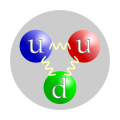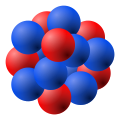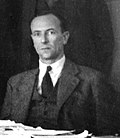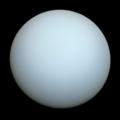The proton radius puzzle is an unanswered problem in physics relating to the size of the proton. Historically the proton charge radius was measured by...
23 KB (2,226 words) - 20:54, 22 May 2025
The rms charge radius is a measure of the size of an atomic nucleus, particularly the proton distribution. The proton radius is about one femtometre =...
13 KB (1,710 words) - 04:45, 26 May 2025
of the proton radius. The results of these measurements diverged from the then accepted value giving rise to the so called proton radius puzzle. Later...
46 KB (5,577 words) - 13:22, 28 May 2025
mysteries, encompassing research projects, include the proton spin crisis and the proton radius puzzle. The Electron–Ion Collider user group consists of more...
7 KB (779 words) - 22:13, 12 May 2025
predicted value of that physical constant? Proton radius puzzle: What is the electric charge radius of the proton? How does it differ from a gluonic charge...
104 KB (11,406 words) - 09:44, 30 May 2025
replaced by a negative muon—that is, a proton orbited by a muon. It is important in addressing the proton radius puzzle. Muonic hydrogen atoms can form muonic...
13 KB (1,572 words) - 00:13, 1 April 2025
hydrogen. This proved that the supposed discrepancy known as the proton radius puzzle did not exist. "Eric Hessels". yorku.ca. Archived from the original...
2 KB (139 words) - 21:57, 26 May 2025
Protons have a positive charge distribution, which decays approximately exponentially, with a root mean square charge radius of about 0.8 fm. Protons...
63 KB (6,583 words) - 14:52, 4 June 2025
employed (see proton radius puzzle). Nuclide size ranges up to ≈ 6 fm. The largest stable nuclide, lead-208, has an RMS charge radius of 5.5012 fm, and...
31 KB (3,500 words) - 21:25, 15 May 2025
Atomic nucleus (category Proton)
The atomic nucleus is the small, dense region consisting of protons and neutrons at the center of an atom, discovered in 1911 by Ernest Rutherford at...
33 KB (3,945 words) - 08:33, 24 May 2025
section of an 11 MeV proton with a target proton 1.75 fm – the effective charge diametre of a proton 2.81794 fm – classical electron radius 3 fm – approximate...
186 KB (17,555 words) - 21:31, 4 June 2025
neutron transforms it into a proton by the emission of an electron accompanied by an antineutrino; or, conversely a proton is converted into a neutron...
64 KB (7,657 words) - 18:21, 18 May 2025
quantum numbers. The proton–neutron model explained the puzzle of dinitrogen. When 14N was proposed to consist of 3 pairs each of protons and neutrons, with...
76 KB (8,791 words) - 18:05, 9 May 2025
Kaon (redirect from Τ–θ puzzle)
The estimated mass of the new particles was very rough, about half a proton's mass. More examples of these "V-particles" were slow in coming. In 1949...
39 KB (3,217 words) - 03:46, 25 May 2025
supposed discrepancy in the proton radius between electronic and muonic hydrogen does not exist, settling the proton radius puzzle. 7 September – The Indian...
262 KB (24,923 words) - 05:49, 2 June 2025
consisting of protons and neutrons were quickly developed by Werner Heisenberg and others. The proton–neutron model explained the puzzle of nuclear spins...
100 KB (11,206 words) - 15:33, 26 May 2025
away from the proton. For infinite values of r, the energy is zero, corresponding to a motionless electron infinitely far from the proton. The total energy...
75 KB (10,385 words) - 21:41, 4 June 2025
(massive particles). The proton–proton chain occurs around 9.2×1037 times each second in the core, converting about 3.7×1038 protons into alpha particles...
173 KB (19,374 words) - 06:57, 4 June 2025
White dwarf (section Mass–radius relationship)
the star's surface area and its radius can be calculated. Reasoning of this sort led to the realization, puzzling to astronomers at the time, that due...
154 KB (17,962 words) - 15:07, 27 May 2025
wave theory of light. When any charged particle (such as an electron, a proton, or an ion) accelerates, energy is radiated in the form of electromagnetic...
14 KB (2,532 words) - 13:39, 29 May 2025
Quarks are fundamental particles that make up composite hadrons such as the proton, neutron and pion. QCD is a type of quantum field theory called a non-abelian...
45 KB (5,927 words) - 15:48, 26 May 2025
gov. Retrieved 13 August 2023. "proton mass energy equivalent". NIST. Retrieved 4 November 2011. "CODATA Value: proton mass energy equivalent in MeV"....
140 KB (9,707 words) - 16:16, 31 May 2025
{\displaystyle r=n^{2}a_{0},\!} where a0, called the Bohr radius, is equal to 0.0529 nm. The Bohr radius is the radius of the smallest allowed orbit. The energy of...
77 KB (9,438 words) - 15:33, 5 June 2025
atmospheric layer, the corona. This plasma mostly consists of electrons, protons and alpha particles with kinetic energy between 0.5 and 10 keV. The composition...
57 KB (6,718 words) - 12:33, 29 May 2025
the nuclear radius. Substituting these in gives the value of about 2.7×10−14 m, or 27 fm. (The true radius is about 7.3 fm.) The true radius of the nucleus...
100 KB (13,585 words) - 18:34, 22 May 2025
The primary component has 58% of the mass of the Sun, 55% of the Sun's radius, and a very low projected rotation velocity of 1 km/s at the stellar equator...
27 KB (2,463 words) - 10:48, 31 May 2025
Burwitz, Vadim; Haberl, Frank W.; Zavlin, Vyatcheslav E. (June 2004). "The puzzles of RX J1856.5-3754: neutron star or quark star?". Nuclear Physics B: Proceedings...
26 KB (3,067 words) - 14:25, 29 May 2025
; Momany, Yazan; Carraro, Giovanni (2004). "Ω Centauri: The Population Puzzle Goes Deeper". The Astrophysical Journal. 605 (2): L125. arXiv:astro-ph/0403112...
32 KB (3,932 words) - 10:31, 10 January 2025
long corkscrew. Uranus's magnetosphere contains charged particles: mainly protons and electrons, with a small amount of H2+ ions. Many of these particles...
159 KB (15,670 words) - 01:25, 5 June 2025
constants (the gravitational constant, the mass of the proton, the age of the universe, etc.). A puzzling aspect of this was that some of the relations hold...
74 KB (9,532 words) - 01:45, 30 May 2025

















